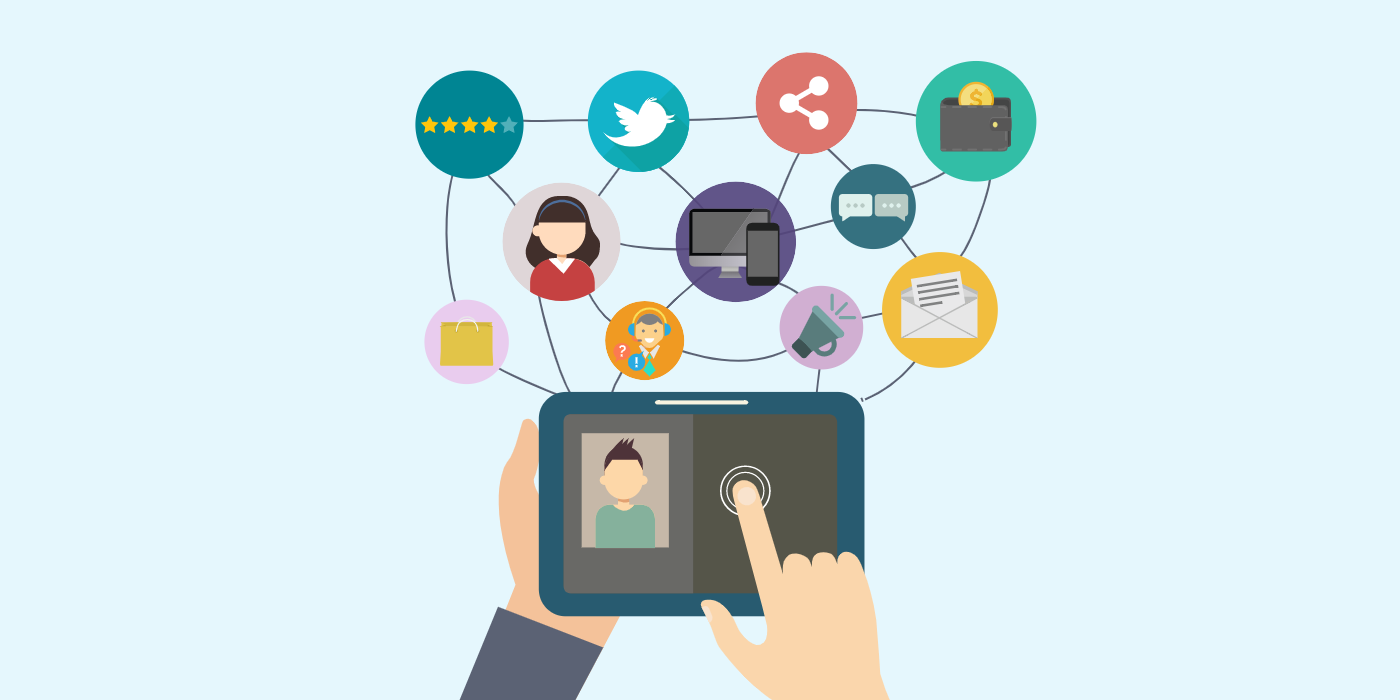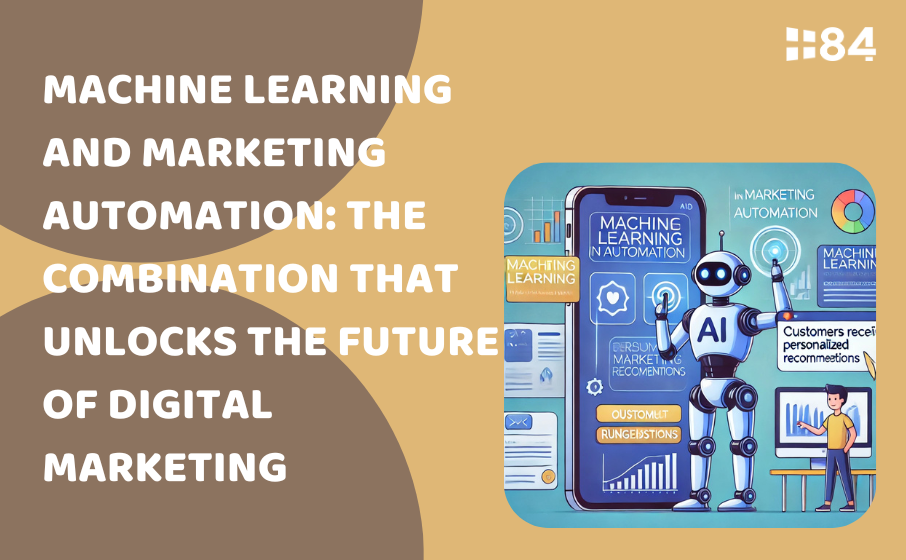Today’s businesses must process massive amounts of information while meeting customers’ growing expectations for personalization. How can companies harness data intelligently to enhance marketing performance and boost conversions?
The answer lies in the powerful combination of Machine Learning (ML) and Marketing Automation. When these two technologies work together, businesses can not only optimize their marketing strategies but also deliver hyper-personalized customer experiences that drive exceptional revenue growth.
But what exactly are Machine Learning and Marketing Automation? How do they work, and why has their integration become an inevitable trend in modern marketing? Let’s explore these questions in detail!
Machine Learning – The Predictive Powerhouse of Marketing
Have you ever wondered how e-commerce platforms suggest the exact products you’re interested in or why some ads seem to read your mind? This is the power of Machine Learning, a branch of AI that enables computers to learn from data and continuously improve their intelligence without being explicitly programmed.
How Does Machine Learning Work?
Imagine Machine Learning as an ultra-intelligent analyst capable of scanning millions of data points, detecting hidden patterns, and making highly accurate predictions. In marketing, ML does more than automate processes—it refines strategies, personalizes customer interactions, and maximizes efficiency.
Here are some key applications of Machine Learning in digital marketing:
- Predicting Customer Behavior: ML analyzes historical data to identify high-potential buyers, allowing businesses to focus on the most promising leads.
- Smart Customer Segmentation: Say goodbye to mass marketing! ML automatically segments customers based on behaviors, preferences, and purchasing habits, ensuring the right message reaches the right audience.
- Real-Time Ad Optimization: Are your ads truly effective? ML optimizes ad budgets by selecting the best audience, timing, and platform for maximum return on investment (ROI).

Marketing Automation – Making Marketing Easier and Smarter
Have you ever wished you could reach the right customers at the right time with the right message—without spending hours manually sending emails or tracking data? Marketing Automation makes that a reality!
Simply put, Marketing Automation is the use of software to automate marketing activities, helping businesses save time, improve efficiency, and deliver more personalized experiences. Instead of performing repetitive tasks manually, businesses can streamline processes from email marketing to customer management and data analysis.
How Does Marketing Automation Work?
Think of it as an “AI assistant” that silently executes key marketing tasks without needing constant supervision. Specifically, Marketing Automation helps businesses:
- Automate Email Marketing: Send personalized emails based on customer behavior. For example, if a user subscribes to a newsletter, the system automatically sends a welcome email with an exclusive offer.
- Manage and Nurture Leads: Build intelligent marketing campaigns based on user activity. If a potential customer frequently views a product but hasn’t purchased, the system can trigger a special offer reminder.
- Smart Customer Segmentation: Instead of sending the same message to everyone, Marketing Automation creates customer groups based on real-time data, ensuring personalized content delivery.
The Synergy Between Machine Learning and Marketing Automation
When Machine Learning joins forces with Marketing Automation, businesses can revolutionize their marketing approach with smarter, more personalized, and highly efficient customer experiences. Here are three ways this integration is transforming marketing:
1. Predicting and Optimizing Marketing Strategies
Instead of relying on guesswork, ML analyzes historical data to predict customer behavior with precision.
For example, an ML-powered system can detect customers at risk of leaving and trigger personalized retention campaigns—such as promotional emails, exclusive offers, or free trial invitations—before it’s too late.
2. Real-Time Content Personalization
The era of generic email blasts and intrusive ads is over. Today’s customers expect brands to recognize their unique preferences.
Machine Learning learns from browsing history, purchase patterns, and user interests to recommend tailored content across emails, ads, and websites.
Example: You search for a laptop on an e-commerce site. The next day, you receive an email featuring that exact laptop with a special discount. This isn’t a coincidence—it’s Machine Learning in action!
3. Behavior-Based Automated Targeting
Delivering the right message, at the right time, to the right person is the secret to marketing success. With ML-powered Marketing Automation, businesses can fully automate this process.
Example:
- A customer frequently revisits a product page without purchasing? The system automatically sends them an exclusive discount to encourage the purchase.
- A user abandons their cart? A reminder email with a small discount might be the perfect nudge to complete the order.
Why This Combination is Essential for Modern Marketing
In today’s competitive digital landscape, mass email campaigns and generic ads are no longer effective. Customers demand personalized experiences, while businesses must optimize costs and improve efficiency.
So how can you increase conversions and retain customers without spending hours on manual analysis? The answer is Machine Learning + Marketing Automation!
1. Maximizing Campaign Effectiveness
Worried about overspending on ads with little return? Machine Learning can change that.
Instead of distributing ad budgets based on intuition, ML analyzes customer behavior to identify the most effective channels, automatically optimizing campaigns to reduce waste and maximize ROI.
2. Delivering Flawless Customer Experiences
Have you ever received a promotion for an item you were just searching for? That’s not luck—it’s the power of Machine Learning.
Rather than sending generic messages, ML tailors content based on customer behavior, preferences, and purchase history. This level of personalization makes customers feel valued, increasing engagement and brand loyalty.
3. Data-Driven Decision Making
Do you really know what your customers want? What products they’ll buy next? When they might leave?
Instead of relying on assumptions, ML analyzes real-time data to provide precise insights, helping businesses:
- Forecast consumer trends to prepare the right products.
- Identify at-risk customers and launch retention campaigns.
- Optimize marketing strategies to stay ahead of competitors.
With data-driven decisions, businesses can avoid costly mistakes and maximize marketing performance like never before.
Case Study: Amazon – AI Knows You Better Than You Do!
Ever browsed Amazon, only to receive a perfectly timed email featuring the exact product you viewed—with a special discount? Or noticed that the homepage suggests items that match your preferences flawlessly?
That’s Machine Learning in action.
Amazon collects and analyzes search behavior, purchase history, and browsing habits to predict customer needs. The system then automatically displays the most relevant products.
But it doesn’t stop there! If you abandon your cart, Amazon may send a gentle reminder with a discount to encourage you to complete your purchase.
By leveraging this level of AI-driven personalization, Amazon enhances shopping experiences, boosts customer satisfaction, and ultimately increases sales. That’s why customers keep coming back—because Amazon always seems to know what they want, even before they do!

Challenges and Considerations When Implementing: What Should Businesses Prepare For?
The combination of Machine Learning and Marketing Automation can revolutionize marketing strategies, but to fully leverage its potential, businesses must overcome several critical challenges. Without proper preparation, the system may underperform or even backfire. Below are three key factors businesses should carefully consider:
1. Data Quality
Machine Learning is not magic—it is only as smart as the data it is trained on. If the input data is inaccurate, incomplete, or disorganized, the results generated by the algorithms will also lack accuracy. This follows the principle of “Garbage in, garbage out.”
Solution:
- Establish a standardized data collection process to ensure customer information is accurate, complete, and clean.
- Continuously update, clean, and remove outdated or duplicate data.
- Integrate multiple data sources (CRM, website, social media, email, etc.) to gain a comprehensive view of customers.
2. Privacy and Security
Personalizing customer experiences is a significant advantage, but businesses must be cautious not to cross the line into becoming “creepy stalkers.” Regulations such as GDPR (European Union) and CCPA (California, USA) impose strict requirements on personal data protection, with violations potentially resulting in multi-million dollar fines.
Solution:
- Be transparent in collecting and using customer data. Always obtain consent before storing or utilizing personal information.
- Provide customers with the option to edit or delete their data at any time.
- Use advanced security tools, such as data encryption and two-factor authentication, to safeguard customer information from hackers.
3. Investment Costs
Machine Learning and Marketing Automation are not plug-and-play solutions that businesses can implement instantly. They require:
- A robust technology infrastructure, including software and data storage systems.
- Skilled personnel to train AI models, analyze data, and optimize campaigns.
- Ongoing maintenance costs to update technologies, upgrade systems, and adapt to new trends.
Solution:
- Start small: Run pilot campaigns before scaling up.
- Leverage existing AI platforms: Many tools like HubSpot, Marketo, and Salesforce already integrate Machine Learning, reducing development costs.
- Train internal teams: Utilize in-house talent rather than relying too much on external vendors.
Conclusion
Machine Learning and Marketing Automation present a powerful combination that enables businesses to optimize marketing efforts, enhance customer experiences, and drive revenue growth.
If your business aims to improve marketing performance and gain a competitive edge, now is the perfect time to integrate Machine Learning into your Marketing Automation strategy. Start by analyzing customer data, selecting the right tools, and implementing a step-by-step approach to maximize effectiveness!


